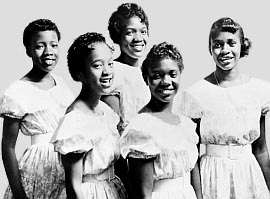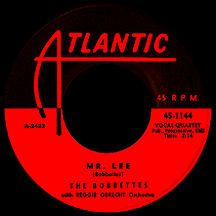THE BOBBETTES
Mr. Lee
If you've ever had a crush on your teacher, I'm sure you can relate to what the five girls known as The Bobbettes were going through at one time. If it's ever crossed your mind to shoot your teacher, and I'm sure there are some who've considered it, you really feel where they were coming from! This group of five pre- to early-teenagers wrote and recorded a song about their false admiration for one schoolteacher in particular, "Mr. Lee," and in a morbid turn came up with another song confessing to his murder (all in good fun, of course). Both records were hits!
Nothing like getting started at an early age: the group's beginnings were in elementary school during glee club at P.S. 109 in New York's Spanish Harlem. The eight original members called themselves The Harlem Queens in an attempt to fashion themselves after the few girl groups they were hearing on the radio, most notably Shirley Gunter and the Queens ("Oop Shoop," 1954) and The Hearts ("Lonely Nights," 1955). Down to a five-member act by 1957, they appeared on Herb Sheldon's popular New York City children's TV show and even made an appearance at the Apollo Theater's "Amateur Night." When Atlantic Records signed them to a contract, the girls were all somewhere between eleven years old and 13, made up of sisters Emma Pought and Janice Pought, Helen Gathers, Laura Webb and the one whose baritone stood out from the rest even then, Reather Dixon.
Harlem Queens seemed a bit rough and localized for the name of a group seeking national exposure, so they changed it to The Bobbettes, suggested by Laura Webb after the name of her niece. Their first single, "Mr. Lee," was a song the girls had come up with about a fifth grade instructor they were not fond of ('the ugliest teacher that you ever did see'), which they had been singing in the hallways for a year or two. Atlantic suggested a more radio-friendly change of lyrics to 'the handsomest sweetie that you ever did see.' When the single was released, the infectious energy of '1-2-3, look at Mr. Lee...'(hiccup!) '...3-4-5, look at him jive' caught on in the summer of 1957, going top ten pop and number one R&B (above and beyond the earlier groups that had influenced them) with a ride on the charts through January of the following year.

Four follow-up singles were released between 1957 and 1959, yet none of them made the national charts. Still, theirs was a unique accomplishment, as most of the sides were written by the five girls, given collective songwriter credit on the labels as Bobbettes. You'd be hard-pressed to find another girl group of the era with a regular track record of writing their own music. They kept busy on package tours (opening for Ruth Brown, LaVern Baker, Sam Cooke and many others at theater engagements, though barred from nightclubs due to their very young age). Atlantic made use of their vocal talents in the studio as backup singers on releases by Ivory Joe Hunter and Clyde McPhatter.
Things were going well for awhile, but without another hit the Bobbettes were scheduled for one last Atlantic studio session in February 1959, resulting in "I Shot Mr. Lee," an extreme rewrite of their signature smash ('help, help, murder, police, the girl's after me with a gun...shot him in the head, boom boom') which the label set aside...after all, how could such a distortion of the original possibly go anywhere? Free from Atlantic, they went to Teddy Vann's Triple-X Records and recut the song, and though nowhere near the massive level of "Mr. Lee," the brazenness of the lyrics alone was enough to gain the song some airplay and sales, and it was a fair-sized hit in August 1960. Atlantic released its earlier take as soon as they figured out what was going on, but the Triple-X version had already made its mark. A nice run of chart appearances followed, including "Have Mercy Baby" (previously a number one R&B hit for The Dominoes in 1952) and its flip, "Dance With Me Georgie" (a variation of Etta James' "The Wallflower") in '60 and two more for the End and Gone labels in 1961, "Mr. Johnny Q" and "I Don't Like It Like That" (an answer to Chris Kenner's million seller "I Like It Like That"). Energetic and enjoyable every one, they characteristically showcase Dixon's raucus vocal sound and are instantly recognizable as Bobbettes songs.
When Gathers left the group in 1961 the remaining members, still not quite in their twenties, continued as a foursome and spent most of 1961 and '62 recording for the King and Jubilee labels. They weren't credited for their backing vocals on Johnny Thunder's 1963 hit "Loop De Loop," but the label, Diamond, signed them to their longest-lasting contract since Atlantic. Teddy Vann (Thunder's producer) and Hutch Davie were at the controls of seven singles issued between 1963 and '65, but none of them made much impact. There were a couple of releases for RCA Victor in 1966 (including a lively version of The Womack Brothers' "It's All Over," which had been an early hit for The Rolling Stones as "It's All Over Now") and a series of efforts for the Mayhew label in the early 1970s that indicated a more mature approach. But it was the end as recording artists. Taking regular jobs, getting married and raising families all happened as in life it usually does. But despite getting shot, "Mr. Lee" lived on! The Bobbettes continued doing live shows, mostly on weekends, whenever possible, eventually marking more than 50 years as performers.


